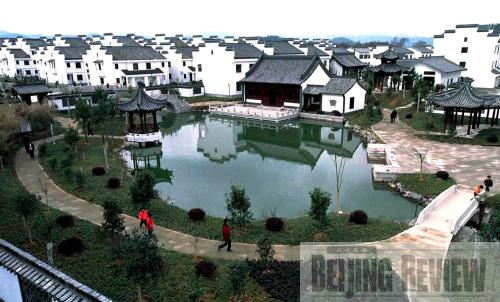|
Regarding income distribution policies, China has adopted a distribution system that values work performance. Labor, capital, technology, managerial expertise and other production factors should have incomes distributed according to their respective contribution. It strives to raise the income of low-income groups, expand the proportion of middle-income groups, effectively regulate excessively high incomes and place bans on illegal gains. All this is aimed at narrowing the income gap and achieving common prosperity.
China's social security policies, covering both urban and rural residents, are based on social insurance, assistance and welfare. While focusing on basic old-age pension, basic medical care and basic-living guarantee system, they are supplemented by charitable contributions and commercial insurance.
Urban and rural management policies are designed to balance development between urban and rural areas, implement the principles of "industry supporting agriculture" and "cities helping villages," and eliminate urban-rural disparities. Reforming the household registration, employment, social security, healthcare, and housing systems to narrow the gap between urban and rural areas has also been a priority of government plans.
China gives priority to educational development, uplifting students' all-around qualities. Its policies underline the government's responsibility to ensure compulsory education, popularize nine-year compulsory education programs, strive to develop vocational education, advance the quality of higher education and attach great significance to education equality, all in an effort to build up a thoroughly educated society.
Healthcare policies, as effective as they have become over the years, need further reform. The government should take full responsibility to supervise the progress of the reform and build up a basic healthcare system that benefits both rural and urban residents in a bid to provide safe, effective, convenient and affordable medical services to the public.
Public security policies have always been a priority, and China has established a public security system, covering public order, food and drug safety, workplace safety, traffic safety, and disaster relief. Adhering to the rule of law, China implements justice for criminal, promotes citizens' participation in helping to maintain public security, protects human rights and safeguards normal social order.
 |
|
BRIDGING THE CITY: The 378-year-old Gongchen Bridge, above the Beijing-Hangzhou Canal, and its surrounding buildings show a beautiful combination of modern and ancient Hangzhou (TAN JIN) |
According to the Chinese Government's environmental protection policies, China gives priority to the protection and orderly development of natural resources, and the control of irrational exploitation. It emphasizes the importance of taking precautions, addressing environmental problems in a comprehensive manner, and tackling pollution at the source, and has committed itself to building an energy-saving and environmentally friendly society.
The importance of social development and the implementation of public policies took hold gradually in China. After the founding of New China in 1949, socialist priorities mainly focused on three fields—politics, the economy and culture—while not much attention was given to social development.
 |
|
RISING VILLAGES: A park, funded by the government to provide green space in a farming community, is surrounded by traditional houses in Xinweizhuang Village in Zhejiang Province (XINHUA) |
As China made economic improvements, the need to balance economic and social development became increasingly pressing. In a report to the 12th National Congress of the CPC held in 1982, great significance was attached to improving people's livelihoods.
In December 1982, the Fifth Session of the Fifth National People's Congress changed the Five-Year National Economic Development Plan, which had been executed for 25 years, into the Five-Year Plan for National Economic and Social Development, effective from the sixth five-year plan. Since then, the government has paid close attention to both economic and social development.
|

